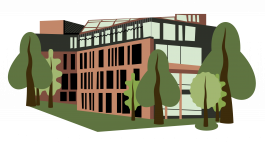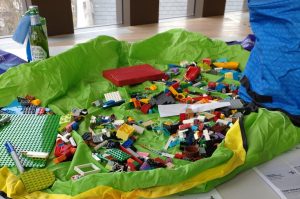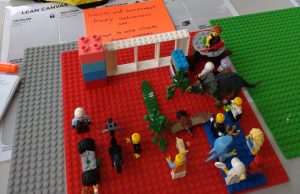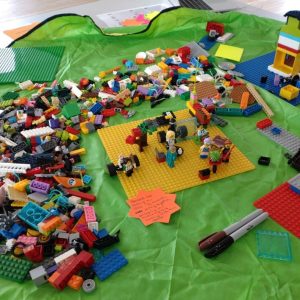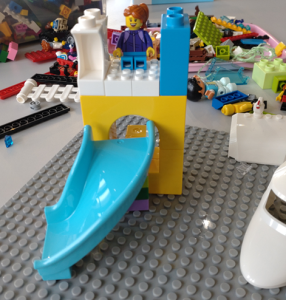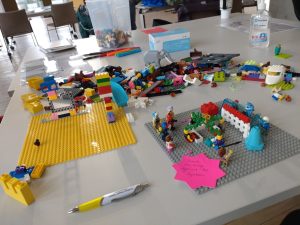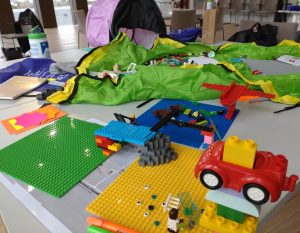Lego Serious Play
“Running this session about Lego Serious Play for PhDs really helped open my own eyes to re-search currently being done by students. It’s very interesting learning students talk about their work, and I’m always amazed by how well Lego Serious Play works as a methodology for tearing things out.
Fundamentally we were able to articulate the fact that wished problems will not be solved by any one discipline, whether it be climate change or COVID-19. Lego really helps us visualize how the relationships can work.
It was a pleasure to Facilitate today. I am hoping the students will go forward and continue to use Lego for problem Solving.”
-Facilitator and Speaker: Briony Supple
“The Lego Serious Play session delivered brilliantly by Dr Briony Supple was an invaluable ex-perience. This activity challenged everyone to reconsider and effectively communicate our research. In academia we dedicate ourselves to highly complex and specific problems – there-fore it is often difficult to step out from our encapsulated skills, and effectively convey our message to a naïve listener. In a fast-paced world, communicating effectively is more and more a crucial skill, which is often disregarded during formal academic training.
In conclusion, this activity really brought all the participants together, while delivering an in-teresting communication challenge in a very creative, fun and engaging fashion.”
-Joana Pereira
“I have done a Lego Serious Play before, and I found it 120% helpful. This session with Dr Brio-ny Supple was really wonderful to watch and do. I loved watching the participants engage with the questions and of course the Lego’s. When doing research, it can be hard seeing your work outside of your head or on a piece of paper. Lego Serious Play allows for your research to take a 3D view and when you get to play with Legos, ideas become fun and interactive. By the end of the session, all the groups really worked together, and the boundaries of our own fields broke down and they were working together.”
-Marnina Winkler
- Lego Serious Play Session
- Lego Serious Play Session
- Lego Serious Play Session
- Lego Serious Play Session
- Lego Serious Play Session
- Lego Serious Play Session
Key Takeaways from Participants
Bharathesh Badadamath
- Realized there are smart people around us with their own expertise in their area
- If they collaborate, then they can solve most of the problems in the world
- Having good communication with people from different backgrounds and knowing what they are doing and building professional connection to seek potential interdisciplinary research
Martha Shaka
- Everyone counts and has a say in solving our societies problems. Creating solutions can come by doing it together.
- Interdisciplinary vision- Do it when everyone or every discipline is present in the discussion. Ask what other disciplines can contribute.
Jorge Diaz
- That it is necessary for different disciplines to work together to solve the problems in our society
- Associating the problems or findings of my research with other areas in the university through seminaries or press releases.
Haseeb Younis
- The key points that we have learned so far are, we have to work with the people of different disciplines as it is compulsory for the social development, brainstorm new ideas and providing solutions to the other fields that are difficult for them to achieve with technology.
- I will bring the interdisciplinary vision in my life by working with people from other fields e.g. I am a computer scientist and working with biologist to provide solutions to cancer research community.
Anonymous
- Doing your research within your box will only think within your box- but to appreciate and fully understand a problem we need to communicate more
- For myself- going to try talk to other researchers more, but not only research (cause talk in itself is only a box as well) maybe even stop avoiding topics with my friends and family
Anonymous
- I learnt that if you want to be useful you’ve got to accept that you have to bend to circumstances instead of bearing an ideal image of your discipline in your mind. In other words, it is messy and you have to adapt to the mess
- Therefore I will try not to label too much as non-sociology things with which I’m not familiar and questions I don’t know hot to answer.
Anonymous
- Learn about how to work with interdisciplinary people
- Learning by doing
- This could be beneficial to work in teams with other disciplinary people.
Anonymous
- What we study can be presented as “fun”
- Future: Appreciate what I’m doing can be done and achieved because of other fields e.g. background info from micro bio, states, and analyses.
Anonymous
- Knowledge sharing across disciplines
- Aim not to replace but rather leverage on the strength of other disciplines
- Collaborate with researcher from other fields
- Communicate my research to people outside my area
Anonymous
- Everybody has unique ideas and it is nice to see how they represent their work in different ways and even when we all use the same materials
- Build first- without thinking too much, then can explain afterwards
- Each person in a group brings skills and ideas. It is important to hear other peoples ideas as it is to think about/explain your own.
